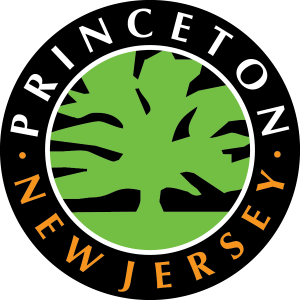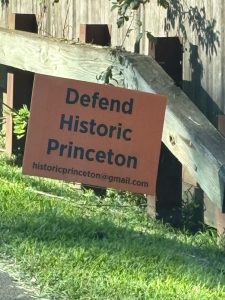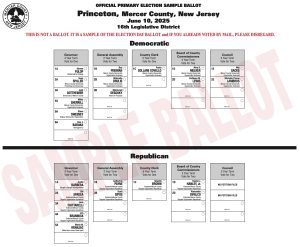Elections in America allow people to decide who will represent them. When a candidate receives a majority of votes, it is said that person has the will of the voters and a mandate to govern.
Though New Jersey voting begins with Primary elections in June to choose the major party candidates and onto the General Election in November, Princeton municipal seats (Mayor and Council) have had no candidate pools to narrow down in recent years.
There has not been a Republican on the municipal ballot since 2018, and there has not been any contest in the Democratic primary since 2020. In the past five Primary elections in Princeton, the people that have chosen to run on the Democratic ticket have not had to beat another candidate to move on and win the General Election. All municipal leaders serving today have been elected through no-contest.
Recent controversy over municipal redevelopment has led some in the community to question whether Princeton’s leaders are making the right decisions. Some have gone so far as to question if they have the will of the voters. Do no-contest elections provide the same mandate as those that are heated or even remotely contested?
 Princeton’s leaders have won the elections with a majority of votes, so others argue that gives the winners a mandate. In the 2024 General election, Mayor Mark Freda was re-elected with the vote of 10,223 people (earning 99% of votes). Councilman Leighton Newlin (also an incumbent) got 9,825 votes and Brian McDonald (who took the seat relinquished by longtime Councilwoman Eve Niedergang) received 9,885. The races included one mayoral candidate on the ballot for that position and two Council candidates running for the 2 seats. Nobody ran against them, and more than half of Princeton’s 21,364 registered voters did not vote.
Princeton’s leaders have won the elections with a majority of votes, so others argue that gives the winners a mandate. In the 2024 General election, Mayor Mark Freda was re-elected with the vote of 10,223 people (earning 99% of votes). Councilman Leighton Newlin (also an incumbent) got 9,825 votes and Brian McDonald (who took the seat relinquished by longtime Councilwoman Eve Niedergang) received 9,885. The races included one mayoral candidate on the ballot for that position and two Council candidates running for the 2 seats. Nobody ran against them, and more than half of Princeton’s 21,364 registered voters did not vote.
“I agree this is a trend that is not good. It could be a lack of interest, or it could be the feeling that beating an incumbent elected official is too difficult,” Mayor Mark Freda shared with Princeton Perspectives. “Any political party with people in office needs to build a bench of future candidates. Elected officials move or decide not to run again; we need new people ready to run for office. We should never vote for someone just because they are in office now; we need to pay attention to what they do. How do they vote? Are they out in the community? Do they actually listen? Do they actually consider what you have to say? Those are the reasons to vote for someone.”
SPEAK OUT
To engage with Freda’s litmus test, one has to not only be paying attention but also be willing to speak out and share your thoughts with leadership. This can be done independently or as a group. One need look no further than recent large public efforts such as “No Kings Day” and “Hands Off” protests held in town, where attendees were speaking out against actions of the federal government. But things do not always need to be large-scale to be heard.
One could privately email the Mayor or Council members to share thoughts or invite them to meet you one-on-one. There are also opportunities for community members to speak up at every Council meeting, held the 2nd and 4th Tuesdays of the month. People attending in person and those on Zoom are offered up to three minutes to share thoughts during the meeting’s Public Comment. Once one shares a comment there is no back-and-forth, which some residents have shared leaves them frustrated and limits advancing their concerns. Locals have also said the timing and format of meetings sometimes make it difficult for people to take part. Those with an opinion that is in strong opposition to the leadership noted it may be hard or even dangerous to speak up publicly.
“Many Republicans share our thoughts with municipal leaders. We had David Cohen, a Councilman in favor of redevelopment, at one of our [committee] meetings. A number of people spoke up there. We complained about everything from zoning, density, overdevelopment. They know, but they don’t care. Princeton is an irremediable echo chamber. The Democrats so far outnumber Republicans,” Princeton Republican Committee Chair Dudley Sipprelle shares. “Furthermore, there is a Democratic machine in town that is nasty. They go after people. They threaten people. Republicans move to town and find out if they have a business and speak up, they’ll be ostracized, if not directly threatened by Democrats. It’s happened too many times to talk about.”
 Yet lately, some (comprised of Democrats, Republicans and Unaffiliated) who oppose Council’s decisions, took to the streets, posting signs on their property and other nearby spaces. Several people are speaking out in the press as well. With both positive and negative reactions, it has sparked both conversation and attacks. There have been numerous Letters to the Editor recently in various local publications, sharing public sentiments of concern with regards to municipal leaders and redevelopment decisions. Responding to commentary Councilman Leighton Newlin had shared in Town Topics about the Defend Historic Princeton signs/campaign, resident Jane Maclennan wrote a letter posted on June 18th in which she stated, “…Even if elected officials are not held to a codified standard of conduct, at the very least they owe a duty to the electorate to represent all residents, not only one interest group.”
Yet lately, some (comprised of Democrats, Republicans and Unaffiliated) who oppose Council’s decisions, took to the streets, posting signs on their property and other nearby spaces. Several people are speaking out in the press as well. With both positive and negative reactions, it has sparked both conversation and attacks. There have been numerous Letters to the Editor recently in various local publications, sharing public sentiments of concern with regards to municipal leaders and redevelopment decisions. Responding to commentary Councilman Leighton Newlin had shared in Town Topics about the Defend Historic Princeton signs/campaign, resident Jane Maclennan wrote a letter posted on June 18th in which she stated, “…Even if elected officials are not held to a codified standard of conduct, at the very least they owe a duty to the electorate to represent all residents, not only one interest group.”
And on June 11th, local Richard Gulardo wrote in Town Topics “…as residents we have a right to hold our local government accountable for their decisions and it appears some of their decisions are in need of real scrutiny.”
GET INVOLVED
Many locals working to ensure the leaders are representing their residents and being held accountable for their decisions suggest that could be done through future elections, if more people run. But if and until that time, there are some ways that you could get involved now. President of Princeton Community Democratic Organization (PCDO) Jeffrey Oakman feels Council is interested in having an engaged community.
“There’s always roles on boards and commissions that are important,” Oakman states. “So, I’d say raise your hand. There are ways to be involved and make a difference without taking the full step of running yourself.”
Princeton’s Boards, Commissions and Committees (BCCs) are open to Princeton residents that are not elected but want to volunteer to have a role in government. They “play an important role in the Mayor and Council’s policy-making process by providing advice and information to the Mayor and Council [the governing body] on a wide variety of issues. This input can often be the catalyst for innovative programs and improved services delivered to the community,” the BCC Member’s Handbook details.
While Princeton’s 12,565 registered Democratic voters make up the majority, its contingent of Unaffiliated (6,756) and Republican voters (2,043) are also invited to join BCCs.
One could also get more involved in local political committees and organizations including the Princeton Democratic Municipal Committee, Princeton Republican Committee and Princeton Community Democratic Organization.
CANDIDATES & FUTURE DIRECTION
 Since Princeton consolidation in 2013, only Democrats have been elected. Freda says the one-party municipal rule does not concern him too much because even amongst the Democrats there are plenty of disagreements. He also says that party politics don’t play into many municipal decisions.
Since Princeton consolidation in 2013, only Democrats have been elected. Freda says the one-party municipal rule does not concern him too much because even amongst the Democrats there are plenty of disagreements. He also says that party politics don’t play into many municipal decisions.
Oakman similarly is not concerned, as he feels most in Princeton have shared values. “The PCDO and the Democratic party generally embody a core set of values we think are core to the way a democratic town, government and society should work. That seems to be in line with a lot of people in this town as there’s a lot of democratic voters here. That hasn’t always been the case. Right now, the Republican party is not as viable in Princeton because, in my opinion, its values don’t reflect the values of the town.”
There are, though, Democrats who are not aligned with the direction of local leadership, Republicans who disagree completely and unaffiliated voters who may not feel represented. Some want different or more choice while others just want competition to ensure the candidates that win campaign and are then chosen by voters.
“The PCDO in general as an organization likes to have as much participation as possible. We support open and transparent government, and competitive elections,” Oakman adds, urging the PCDO helps but does not decide who will run. “We have run some events in concert with Democratic Municipal Committee about how to run, helping people know what’s required, and we have resources available that can help people. But we do also have membership endorsement vote which is a way to present yourself to the membership and try to earn support of the organization.”
Past PCDO Presidents and former Princeton Councilmembers Jenny Crumiller and Jo Butler have wanted choice and simultaneously worked to offer up support and advice to encourage more people to raise their hands and run.
“We had a meeting in the spring with a diverse group of people from across town, but especially some younger residents, to talk about the necessary steps and filing deadlines to run for office. We definitely planted some seeds and connected people who could be helpful to a campaign,” Butler says. “Coincidentally, I think the proliferation of the Defend Historic Princeton signs is tangible evidence that people are interested in other points of view.”
Though Democrats have a stronghold in town, it has not always been that way. Could a Republican or Independent candidate have an opportunity to lead?
“I applaud anybody who runs, but it’s a tough grind and, in reality, the demographics make it a hill nobody wants to die on. We ran people until we ran out of people willing to run. We have a number of people that say they’re thinking about it, but the timing is not right. They’re not ready until they retire or can live on their own resources. That’s when they’re willing to get involved because they don’t want people going after them,” Sipprelle explains. “We could get a Republican to run be they couldn’t win. The Asian community in town is large and overwhelmingly Democrat. When it gets to the point they feel their interests aren’t represented, maybe one of them will run. That’s the way it’s going to happen. An independent candidate, forget it. In NJ, or Princeton, independent candidates do worse than those registered in the party.”
Having electoral competition also does not have to pit political parties against each other. It can simply be a way for voters to have choice, even if within their own party.
“Competition is a good thing to keep people focused and at the top of their game. I encourage people interested in running to talk to the municipal chair of their political party, to talk to current elected officials,” Freda adds. “Our system works best when everyone is involved and active.”
The November ballot is set for the two open Princeton Council seats this November. Councilwomen Mia Sacks and Michele Pirone Lambros ran uncontested on the Democratic ticket in June, and no Republicans ran. Independent and 3rd Party candidates had to file by June 10th, and none did.
Running for office could be something to keep in mind for the future. Not all residents are built for it, though, and it has been said holding office in Princeton is not an option for everyone due to the long hours and modest pay. Being involved and active by speaking up, showing up and paying attention can be difficult. At best, it could make a difference, and at the least, it could have an impact to ensure your interests are heard. This is true whether you are encouraging what is already being done or pushing for things to change.

Lisa Jacknow spent years working in national and local news in and around New York City before moving to Princeton. Working as both a TV producer and news reporter, Lisa came to this area to focus on the local news of Mercer County at WZBN-TV. In recent years, she got immersed in the Princeton community by serving leadership roles at local schools in addition to volunteering for other local non-profits. In her free time, Lisa loves to spend time with her family, play tennis, sing and play the piano. A graduate of the S. I. Newhouse School of Public Communications at Syracuse University, Lisa was raised just north of Boston, Massachusetts but has lived in the tri-state area since college. She is excited to be Editor and head writer for Princeton Perspectives!


